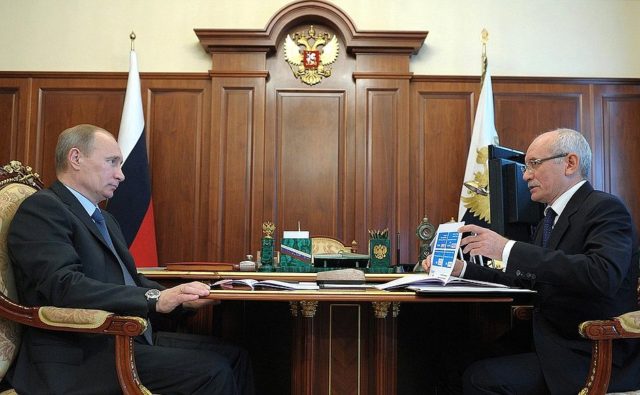
Is Bashkortostan About to Explode Along Ethnic Lines?
Publication: Eurasia Daily Monitor Volume: 13 Issue: 179
By:

By population, Bashkortostan is the largest non-Russian republic in the Russian Federation. And yet, its particular ethnic mix has meant that this Middle Volga region has heretofore been far less unsettled than many others. The titular Bashkirs, a Turkic Muslim people, form only 29.5 percent of its population, with ethnic Russians forming 36.1 percent. The Volga Tatars—another Turkic Muslim people to which the Bashkirs are closely related but with whom they have a complicated relationship because of Moscow’s policies of playing the two off against each other—make up another 25.4 percent of the republic’s population.
Now, however, evidence has been mounting that the republic may be about to explode along ethnic lines. The Bashkirs are becoming increasingly assertive in defense of their rights and their republic, while extremist Russian nationalist groups have been mobilizing and even arming themselves to defend their ethnic group or to attack others. The major question now is whether the Tatars will align with the Bashkirs. Such an outcome would make Turkic Muslims the majority of the population in Bashkortostan and expand neighboring Tatarstan’s influence there and in other non-Russian republics. Alternatively, if Bashkortostan’s Tatars stand aside, this would weaken Kazan’s influence and might very well encourage the local Russian plurality to try to achieve a greater political role across the Middle Volga.
But regardless of what the Tatars of Bashkortostan do, the rising tensions in that republic present a serious problem for Moscow. Like Tatarstan, almost all of the transportation and communication arteries connecting European Russia with Siberia and the Far East pass through these two Turkic Muslim republics. Therefore, any violence in either of them could effectively cut the Russian Federation in two. That is something that has given both Kazan and Ufa greater power than they would otherwise have, on the one hand, and made Moscow more sensitive to what goes on in either of these two republics, on the other.
Last month (October 11), on the anniversary of Bashkortostan’s declaration of state sovereignty in 1990, a group of Bashkir nationalists assembled to complain that Moscow had gutted the provisions of that document. They further argued that the central Russian government was allegedly working hard to destroy the social, economic and political basis of the republic (Kyk-byre.ru, October 19).
According to the resolution adopted by the meeting, Moscow throughout Vladimir Putin’s reign has violated the 1990 Bashkortostan declaration, the Russian Constitution and various international agreements to which Russia is a signatory in order to “concentrate to an unjustified extent power in the federal center.” Specifically, they complained that Putin had suppressed the office of republican president and installed his agent rather than allowing Bashkirs to vote for head of their republic. Additionally, Moscow distorted Bashkir history in serious ways and closed schools and other facilities in other to undermine the Bashkir language. The resolution’s authors charged that Moscow had destroyed local healthcare and other social services as well as key economic facilities—purportedly, in the name of saving money, but in fact to hurt the Bashkirs while inflicting less harm on Russians.
“Not in one of these cases, however, did the republican or federal authorities ask the opinion of the population,” the resolution continues. Moreover, Moscow has been destroying the environment in Bashkortostan and arresting Bashkir activists. Consequently, the activists declared, they are compelled to take action to demand that both Moscow and Ufa live up to the 1990 sovereignty declaration and the Russian constitution, form a “truly federal state with division of powers,” restore Bashkir control over its national resources, restore an elected republic presidency, reopen Bashkir-language schools and other institutions, and end the repression of Bashkir national organizations, including restrictions on where and when demonstrations can take place.
In the weeks since then, there have been a series of small protests in predominantly Bashkir districts within the republic that have sought to promote these goals as well as to complain about the falsification of the September Duma elections and the failure of local officials to live up to their electoral promises and legal responsibilities. Many of the activists have taken to attending local council meetings in the hopes of changing the leaderships of these bodies (Proufu.ru, October 10).
While the Bashkir activists so far remain committed to acting within the law to press their demands, the Russian nationalists in Bashkortostan have demonstrated that they are prepared to use violence to defend their community and to advance their specific interests, including fascist ones (Proufu.ru, October 18). Late last month, Bashkortostan’s interior ministry announced the detention of 30 members of a Nazi band that has sought to spread its views via the schools in Bashkortostan’s cities. Consisting of ethnic Russians, this band united representatives of the Right Sector, which is banned in Russia, and various neo-Nazi groupings. According to law enforcement sources, this group has committed numerous other crimes as well.
What is worrisome is not only the rise and size of this group but the unwillingness of the authorities to do more than to go after its role in placing extremist materials on the Internet. The interior ministry says that it is currently detaining members of the band only on that basis, thus opening the possibility that the group will increasingly turn from the virtual world to the real one. History suggests such a result would represent a dangerous development given that some of the members of this band, operating under the gang name “White River,” have organized demonstrations in favor of Adolf Hitler and against the Bashkirs and other non-Russians.
If the Russian national extremists engage in more attacks, the Bashkirs are now angry enough to respond; and the result could be some of the worst nationalist-inspired violence outside of the North Caucasus in many years.



